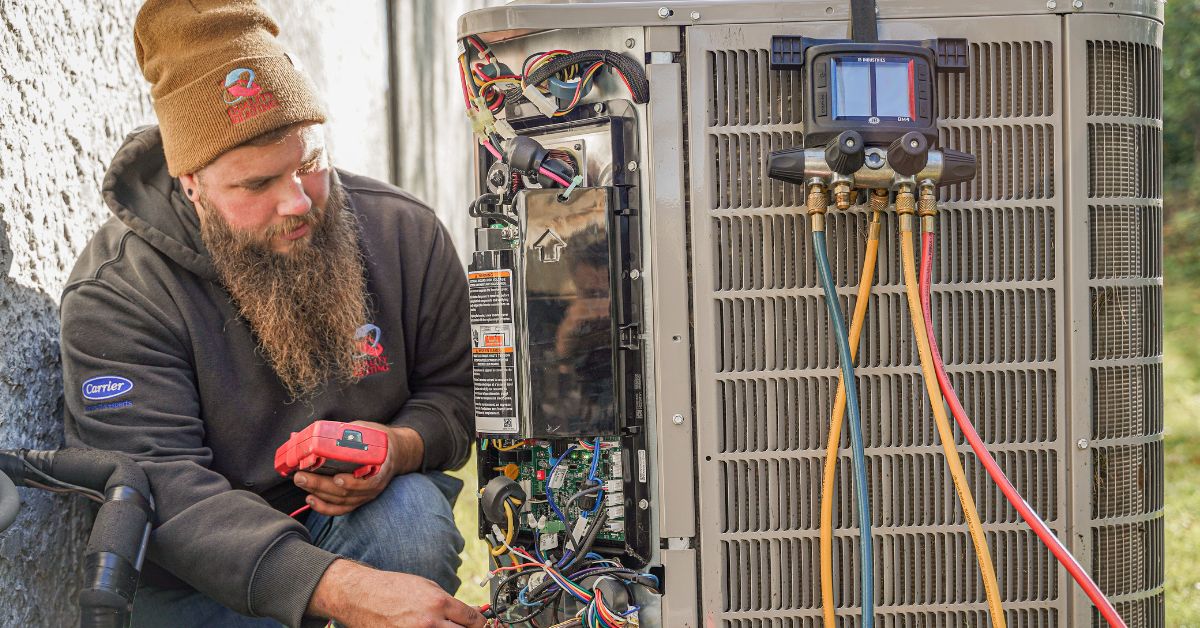The Ultimate Overview to Troubleshooting Common HVAC and Air Conditioner Issues
Property owners commonly experience various problems, from inadequate air conditioning to bewildering noises originating from their units. Recognizing when an issue exceeds basic treatments can be equally critical.
Usual Cooling And Heating Troubles
Recognizing usual a/c issues is essential for maintaining a comfy interior setting. Property owners typically come across concerns that can interfere with home heating, air flow, and cooling systems. One prevalent issue is insufficient airflow, which may result from clogged filters, obstructed ducts, or malfunctioning followers. This can cause irregular temperature levels and enhanced energy intake.
Another frequent concern is refrigerant leakages, which compromise the effectiveness of air conditioning units. Inadequate refrigerant levels can trigger systems to battle in cooling spaces, resulting in higher functional prices and prospective long-term damages. Furthermore, thermostat malfunctions can lead to incorrect temperature level law, creating pain and extreme energy usage.
Dealing with these problems promptly is necessary to avoid additional damage and guarantee optimal system efficiency. Regular maintenance and punctual medical diagnosis of these common Heating and cooling troubles can dramatically improve the dependability and efficiency of home heating and cooling systems, inevitably contributing to a more comfy living setting. hvac.

Indications of Air Conditioning Issues
Acknowledging the indications of cooling concerns is crucial for guaranteeing optimum efficiency and comfort in your home. Among one of the most instant signs is inadequate cooling; if your air conditioner device is not offering the anticipated degree of cooling, it might signify low refrigerant levels, a stopping working compressor, or clogged up filters. In addition, if you discover uncommon sounds-- such as grinding, squealing, or rattling-- this might indicate mechanical troubles that need prompt interest.
One more crucial sign is a boost in energy bills without a corresponding adjustment in usage. This inefficiency usually indicates underlying concerns, such as dirt accumulation in the coils or ductwork leakages. If you find undesirable smells rising from the unit, it could be a sign of mold growth or electrical problems, both of which require instant analysis.
Finally, regular cycling on and off, referred to as short-cycling, can suggest problems with the thermostat or a poorly sized system. By being attentive concerning these signs, you can deal with air conditioner issues early, making sure a comfortable atmosphere and extending the life of your cooling system.
Step-by-Step Troubleshooting
When your cooling system begins to underperform, it's important to damage down the repairing process into manageable actions. Begin next by examining the thermostat setups to ensure it is set to the desired temperature and is in cooling down mode. If the setups are appropriate, examine the air filter; an unclean or clogged filter can significantly hinder airflow and performance. Replace it if needed.
Next, analyze the circuit breaker or fuse box for tripped breakers or blown fuses. If the breaker has actually stumbled, reset it, however watch on it; if it trips once more, there might be a deeper electric concern.
Check the exterior unit for particles, such as fallen leaves or dirt, which can block air flow. Make sure the system is clear which the fins are not curved.
Preventive Maintenance Tips

During these assessments, technicians can recognize and resolve prospective concerns before they rise. In addition, change air filters every 1-3 months to enhance air quality and system efficiency.
Maintain the outdoor device clear of particles, such as fallen leaves and dirt, which can impede airflow. Trim bordering greenery to maintain a check that minimum of two feet of clearance (residential hvac company). Inspect and clean the condensate drain to stop water damage and mold growth
Inspect insulation around air ducts, guaranteeing it continues to be intact to avoid energy loss. Think about a programmable thermostat to optimize energy use according to your routine.
Finally, monitor your system's efficiency routinely, keeping in mind any kind of uncommon sounds or adjustments in temperature level. Aggressive actions are vital in keeping a reliable cooling and heating system, inevitably causing lower energy bills and improved convenience.
When to Call a Professional
Knowing when to call an expert for a/c problems can save you time, cash, and unneeded stress. While some minor troubles may be resolved via DIY troubleshooting, specific indicators indicate that professional treatment is required. explanation If you experience inconsistent temperature levels throughout your home, uncommon noises from your cooling and heating system, or persistent odors, it is crucial to look for specialist support.
In addition, if your unit fails to start or regularly cycles on and off, these might be symptoms of even more serious underlying problems that call for specialized expertise and tools (hvac). Refrigerant leaks, electrical malfunctions, or issues with the compressor can complicate repair work and might position security risks
Another essential factor is the age of your system. If your heating and cooling system mores than 10 years old and shows repetitive problems, consulting a professional for a detailed analysis can aid identify whether repair service or replacement is more cost-effective. If you lack the comfort or experience to handle complicated fixings, it's sensible to depend on a certified technician.
Eventually, prioritizing safety and efficiency is critical. When doubtful, err on the side of caution and call an expert to ensure your a/c system operates ideally.
Conclusion
In conclusion, successfully repairing usual HVAC and AC issues calls for a systematic approach to determine problems, apply detailed remedies, and prioritize precautionary upkeep. Recognizing signs of breakdown can stop small problems from escalating into significant repair work.